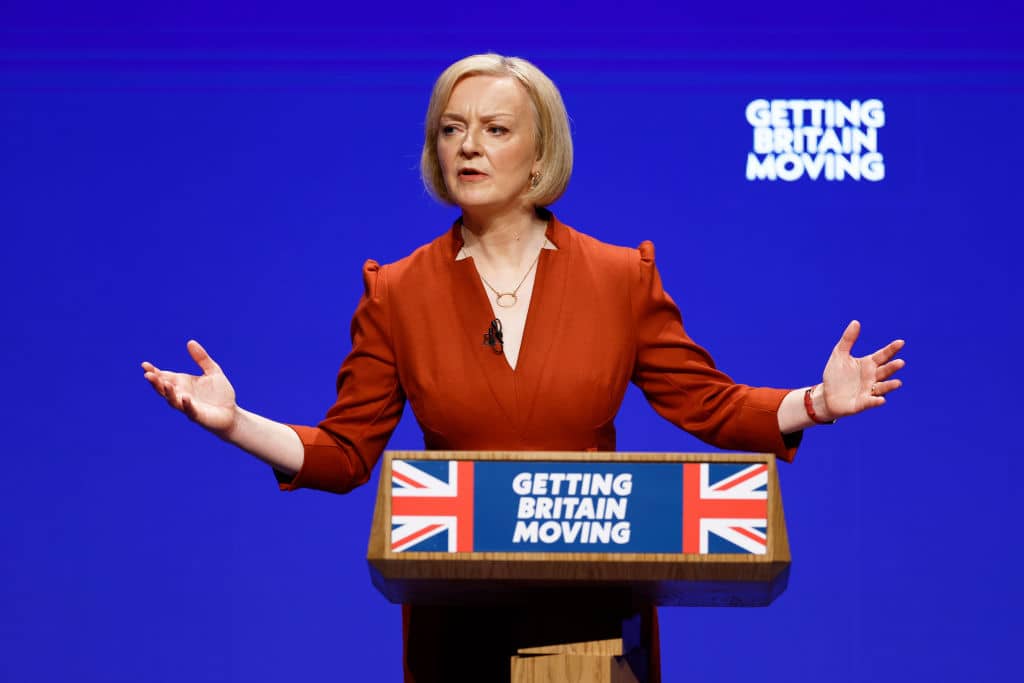Liz Truss’s speech at Conservative party conference was workmanlike; she performed the task she’d set out to do. It was helped by a brief protest in the middle by Greenpeace, which allowed the Prime Minister to drive home her point about an ‘anti-growth coalition’ to a hall that was united in willing her on and booing the protestors.
The Prime Minister is not the most rousing public speaker. Indeed, the standing ovation at the end of the address felt a little uncertain, almost as though the audience was wondering if this was the start of a more energising peroration, not the payoff. She looked awkwardly at the autocue throughout, almost as though she didn’t trust the way it moved. But her aides always say that she isn’t particularly insecure about these idiosyncrasies and neither did she show much sign of being rattled by the dreadful week she’s had. That’s one of the things that her friends often highlight: Truss is one of those people who can just keep ploughing along, even when times are tough. We saw that during the row over her selection in 2009 – and we are seeing it again now.
She said ‘we can’t give in to the voices of decline’, which might have meant Labour – or might have meant choice members of her own government
There is of course a risk that her toughness makes the Prime Minister seem impervious not just to criticism and party revolts, but also to the suffering of the wider public in the cost-of-living crisis. To that end, she tried to show she had empathy with people, insisting that her background meant she had the same hopes and fears as them. She told the hall that she had had to ‘fight’ to get jobs, to ‘juggle’ raising her daughters with her career and that she knew what it was like to be treated differently because she was a woman and she didn’t always fit in. And because of that, she said, she wanted to change things so others didn’t face the same barriers. She has previously talked about the way other children at her school were ‘held back’ by low expectations, but this was the first time she has really talked about being driven by her own experience of having opportunities blocked.
Last night I was talking to one of her opponents on the backbenches, who said he thought the only way to deal with the dramatic and shambolic conference was to front up to it, to say she’d made a mistake in her rush to help people by getting the economy moving. Truss clearly had similar advice from those around her, as she told the hall ‘I get it and I have listened’. I doubt, though, that she will get much credit from that particular opponent – or the others agitating against her on various policy flashpoints, from benefit cuts to fracking. Indeed, when Truss listed the activities of the ‘anti-growth coalition’, including spending too much time on Twitter, and touring the BBC studios, she could just as easily have been talking about members of her own party. She told the hall that ‘we can’t give in to the voices of decline’, which once again might have meant Keir Starmer’s party – or might have meant Michael Gove, Grant Shapps or other members of her own government who have felt safe to sound off in public about various problems with the party.
Truss continued to bulldoze her way through what she wanted to do, offering a list of objectives for her senior cabinet ministers such as Health Secretary Thérèse Coffey and Home Secretary Suella Braverman. For health in particular, that list was quite long – to the extent that Coffey was chuckling in the front row as the PM kept adding more and more massive issues to solve, including the NHS backlog and social care.
The question now is whether Truss gets the time or the space to realise any of these objectives. It’s not just her critics who have given her ten days to ‘sort things out’: loyal backers of hers were telling me last night they thought she needed to turn things around within the next week or so, while admitting they didn’t see how she could. This speech will have helped. Truss seemed determined, unfazed and focused on getting some concrete things done. But she still won’t have bought herself the space to do so: she has an equally determined opposition within her party which will keep her ambition in check. This speech was never going to change that.







Comments